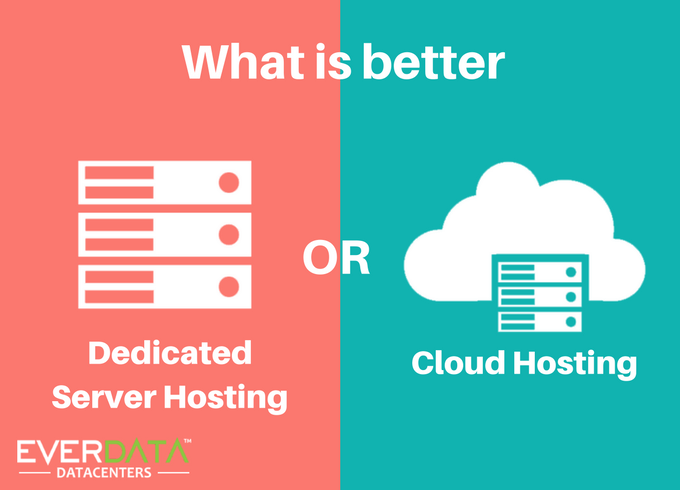
Submitted by Rajiv on

It’s a choice that every company, CIO, and entrepreneur’s face: where to host all that data.
[Tweet “It’s a choice that every company, CIO, and entrepreneur’s face: where to host all that data.”]
In a world where we rely on computing for everything we do, we want. We all want to host our data in an environment that is secure, reliable, relatively inexpensive and easily accessible.
Tip: What Every CEO Needs To Know About the Cloud?
With the endless quantity of data we’re pumping out on a daily basis, we also need somewhere that can handle it all.
The two primary options for hosting today are: Dedicated servers or Cloud Hosting. Which one is preferable? What’s their differences?
That’s why we’re here – to describe both alternatives and assist you to decide what’s right for you.
Cloud Hosting
The cloud – that mysterious place where Apple and Google send all your information. It is a real-time virtual environment that is hosted on various connected servers all at once.
It’s a relatively new concept, but it’s spreading like wildfire and transforming the way we believe concerning storage of data.
[Tweet “Cloud Hosting is spreading like wildfire and transforming the way we believe concerning storage of data.”]
Cloud hosting has many benefits, which is why it has become so successful. It’s immensely reliable.
Tip: Check here list of benefits of managed cloud hosting.
It is because when one of the consecutive servers goes down, the workload will be transferred to other servers, so downtime becomes negligible.
As the cloud hosting run on multiple servers, you can easily add more servers and let unlimited scalability.
Cloud hosting is similar to the Internet. You can access your data from anywhere in the world like the Internet. It relatively costs you low, which is typically pay per usage.
While some corporations may have affairs over the safety of their data, EverData help them by giving dedicated IT support.
Advantages of Cloud Hosting
#Scalability:
With a cloud, you have infinite sources at your disposal. Cloud hosting proposes significant possibilities to scale up or scale down your server based on your needs. On the other hand, a dedicated server has a packed capacity.
#Enhanced Performance:
A cloud hosting environment is commonly built across multiple servers. As well as allowing the scalability mentioned above, it also gives increased performance.
So the load and traffic surges can be shared across more than one server to improve capacity and enables faster loading speed. It ultimately increases the uptime of your website.
#Reliability:
The data is stored and retrieved from multiple machines on the cloud, even if one of the servers crashes down unexpectedly, your site/web app won’t go down, and you may just experience some performance issues and the slowdown in the pace of execution.
#Better value:
With cloud hosting, you only need to pay for the capacity you need at a particular time.
[Tweet “With cloud hosting, you only need to pay for the capacity you need at a particular time.”]
#Flexibility:
The full server configuration commands via a web-based interface or an API.
#Level of control:
You don’t have complete control of the server insides and is limited to offerings provided by your cloud service provider.
Get the Best of Both Worlds: You can experience the advantages of dedicated hosting, but don’t need to bear the massive cost of dedicated hosting, if you don’t have comprehensive requirements.
Dedicated Servers
Rather than store your information in some unknown virtual environment, many companies choose to adopt the dedicated servers. A dedicated server is exactly how it sounds.
The server that an individual hires or leases to handle the data. It’s similar to your personal computer, but on a much greater scale. It is the most traditional route for hosting.
With a dedicated server, there’s no such possibility of a backup taking effect, and your website/web app directly goes on to the backup server in the case crashing of a server, and there is no mid solution possible until the server is fixed, and gets up-and-running again.
Advantages of Dedicated Hosting:
Dedicated servers have plenty of benefits. Of course, servers aren’t perfect and do irregularly go down, but a fast fix can take all your data back to normal.
#Security:
Dedicated servers are more secure because the connections are direct. You know precisely where is your data residing and who has access to it.
[Tweet “Dedicated servers are more secure because the connections are direct.”]
#Peace of mind:
You are the only owner of your server, and your server space will not share with anyone else. You have full control of your data management. When you run of out of storage space, you simply need to get an additional server to handle the new load.
Tip: Check How dedicated servers bridge the gap between provider and consumer?
#Level of control:
A dedicated server offers complete control over the server as one can add programs, applications, and performance improving measures to the server.
#Tailored performance:
As the dedicated server is all yours alone so it can be built on your terms to assure it performs great under the conditions, you need it to.
Conclusion: Cloud vs. Dedicated: Which Is Right for You?
Cloud & Dedicated Hosting each have their fan following. While one organization may get benefit with cloud hosting, a different business might be more productive with dedicated hosting.
Your needs will be of course define which hosting model would be the best fit for you, but as the results have shown, cloud servers are in almost all cases the better option.
The significant difference between dedicated and cloud hosting lies in the accessibility and security. Some people make the decision with cost factor. But when it comes to hosting, cost should not be an obstacle.
If your organization manages highly sensitive data, then dedicated servers are the way to go. They may cost you more in the future compared to the cloud, but as the saying goes, “you can’t place a price on security”, notably when that safety is paramount.
For all other organizations, cloud hosting is the way to go. You can avail your data any time about any place in the world. Therefore your company can go on flawlessly.
The cloud can instantly match up with your growth, and you just have to pay for hosting you required.
However, cloud servers have come a long way and are in almost all use cases the superior choice.
[Tweet “cloud servers have come a long way and are in almost all use cases the superior choice.”]
Tip: What Makes Cloud Hosting Better Than Traditional VPS?


Add new comment